The Malignant Ascites Market is estimated to be valued at USD 673.9 million in 2025 and is projected to reach USD 1533.6 million by 2035, registering a compound annual growth rate (CAGR) of 8.6% over the forecast period.
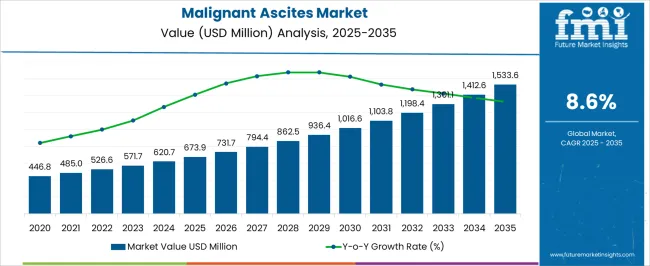
| Metric | Value |
|---|---|
| Malignant Ascites Market Estimated Value in (2025 E) | USD 673.9 million |
| Malignant Ascites Market Forecast Value in (2035 F) | USD 1533.6 million |
| Forecast CAGR (2025 to 2035) | 8.6% |
The malignant ascites market is witnessing steady expansion, driven by the rising incidence of late-stage cancers and the growing need for effective palliative care solutions. Increasing awareness about symptom management and supportive oncology care is influencing treatment adoption, particularly in developed healthcare systems. A growing patient pool, supported by aging populations and higher prevalence of cancers such as ovarian, liver, and gastrointestinal malignancies, is creating sustained demand for therapeutic interventions.
Continuous advancements in procedural techniques and supportive care protocols are improving patient quality of life and treatment outcomes, further shaping market dynamics. Hospitals and specialty clinics are increasingly prioritizing early intervention methods to reduce patient discomfort and improve survival outcomes.
Regulatory approvals for advanced treatment devices and procedures, combined with efforts to reduce complications associated with recurrent ascites, are reinforcing growth prospects As healthcare systems invest more in oncology infrastructure and palliative care programs, the market is expected to strengthen, with a continued emphasis on minimally invasive approaches and supportive therapies that improve patient well-being and reduce healthcare burden.
The malignant ascites market is segmented by treatment type, distribution channel, and geographic regions. By treatment type, malignant ascites market is divided into Paracentesis, Chemotherapy, Diuretics, and Surgery. In terms of distribution channel, malignant ascites market is classified into Hospitals, Diagnostic Centres, Clinics, Retail Pharmacies, and Ambulatory Surgical Centre. Regionally, the malignant ascites industry is classified into North America, Latin America, Western Europe, Eastern Europe, Balkan & Baltic Countries, Russia & Belarus, Central Asia, East Asia, South Asia & Pacific, and the Middle East & Africa.
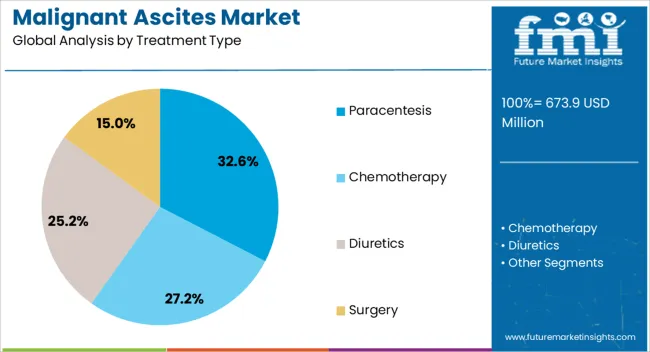
The paracentesis segment is projected to account for 32.6% of the malignant ascites market revenue share in 2025, making it the leading treatment type. This dominance is being supported by its effectiveness in providing immediate symptom relief through the removal of excess peritoneal fluid, which alleviates abdominal discomfort and respiratory distress in patients with advanced-stage cancers. The procedure’s relative simplicity, cost-effectiveness, and ability to be performed repeatedly without the need for highly specialized infrastructure contribute to its widespread adoption.
Increasing utilization in both hospitals and outpatient settings has reinforced its role as the preferred therapeutic option for recurrent ascites management. Clinical guidelines often recommend paracentesis as the first-line intervention for malignant ascites, further supporting its market position.
Advances in catheter technology and image-guided techniques are also improving safety and reducing complications, thereby enhancing patient outcomes As the prevalence of cancers associated with peritoneal fluid accumulation continues to rise globally, the demand for paracentesis is expected to remain strong, ensuring its leadership within the overall treatment landscape of malignant ascites.
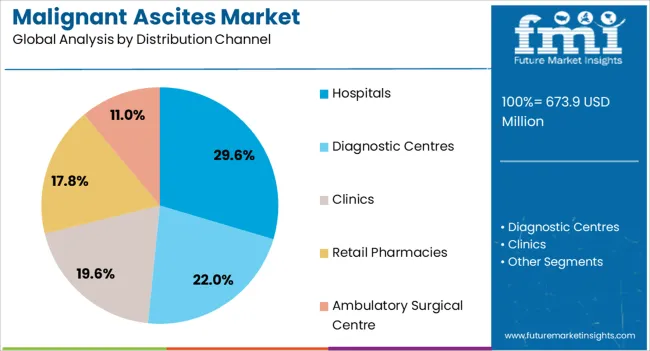
The hospitals segment is expected to represent 29.6% of the malignant ascites market revenue share in 2025, establishing itself as the leading distribution channel. This leadership is being driven by the concentration of advanced oncology care facilities within hospital settings, where multidisciplinary teams can provide integrated treatment approaches. Hospitals offer access to specialized equipment, imaging technologies, and interventional expertise required for effective management of malignant ascites, particularly for recurrent and complex cases.
The ability to provide both diagnostic evaluations and therapeutic interventions under one roof enhances efficiency and improves patient outcomes, reinforcing hospital preference among patients and caregivers. Increasing patient admissions for cancer-related complications and the growing focus on comprehensive palliative care programs are further supporting segment dominance.
Moreover, hospitals play a central role in clinical trials and adoption of advanced therapeutic devices, ensuring early integration of innovative treatment approaches into clinical practice As the burden of cancer-related ascites grows and healthcare systems expand oncology infrastructure, hospitals are expected to remain the primary channel for malignant ascites management, sustaining their strong market share.
Ascites is the formation of excessive fluid in the space surrounding the organs in the abdomen, especially in the peritoneal cavity. It occurs because of the body is unable to remove fluids it produced. Ascites can occur in normal conditions as well as in cancer condition. When ascites occurs due to cancer, often called malignant ascites or malignant peritoneal effusion.
Malignant cells causes irritation in the layers of the abdomen and it leads to production of excessive body fluids. Usually, lymph glands drain excessive body fluids from the body, but, in ascites condition, lymph glands become blocked and it leads to outbreaks of ascites symptoms include loss of sleep, skin problems, fatigue, low blood pressure, and problems with self-esteem.
Malignant ascites caused by different health conditions such as, irritation of the thin membrane of abdomen, destruction in lymphatic system, and disturbances in the liver function due to the cancer cells.
Symptoms of malignant ascites depends on various factors. Main symptoms in the malignant ascites includes swelling of the abdomen, feeling of bloating, abdominal discomfort or pain, fatigue, shortness of breath, weight gain, constipation and ankle or leg swelling.
For diagnosis of malignant ascites, x-ray test, physical examination, ultrasound and CT scans are available. However, physical examinations is not effective in an obese patient cases.
For the treatment malignant ascites, diuretics, chemotherapy, paracentesis and surgeries are available. Diuretics are used for the removal of more fluids from the body and it is effective treatment in this disease condition.
Paracentesis is a process of removal of body fluid by using a catheter and it is used when the diuretics are not effective and the patients are suffering from breathing problems. Food and Drug Administration (FDA), recently approved PleurX catheter, for the treatment of malignant ascites.
Chemotherapy drugs are used in the treatment of malignant ascites and physician give drugs directly to the intra peritoneal cavity of the patient for more effective.
Lack of awareness about the disease is major restraint for malignant ascites market, especially in the obese patient the diagnosis of disease is slightly difficult by physical examination.
Increase in the prevalence rate of various cancers, ovarian cancer, breast cancer, bowel cancer, stomach cancer, pancreatic cancer, mesothelioma in the peritoneum, lung cancer, liver cancer and womb cancer is expected to drive the malignant ascites market owing to the chances of ascites is high in patients who are suffering from these cancers.
Depending on geographic region, Malignant Ascites market is segmented into seven key regions: North America, Latin America, Europe, Asia Pacific, and Middle East & Africa. North America is estimated to contribute maximum revenue share in the global market of Malignant Ascites followed by Europe. Asia Pacific regions are expected to grow at a higher growth rate owing to high occurrence of cancer diseases.
Middle East & Africa is expected to show a healthy growth rate in a forecast period.
The research report presents a comprehensive assessment of the market and contains thoughtful insights, facts, historical data, and statistically supported and industry-validated market data. It also contains projections using a suitable set of assumptions and methodologies. The research report provides analysis and information according to categories such as market segments, geographies, types, technology, material and applications.
The report is a compilation of first-hand information, qualitative and quantitative assessment by industry analysts, inputs from industry experts and industry participants across the value chain. The report provides in-depth analysis of parent market trends, macro-economic indicators and governing factors along with market attractiveness as per segments. The report also maps the qualitative impact of various market factors on market segments and geographies.
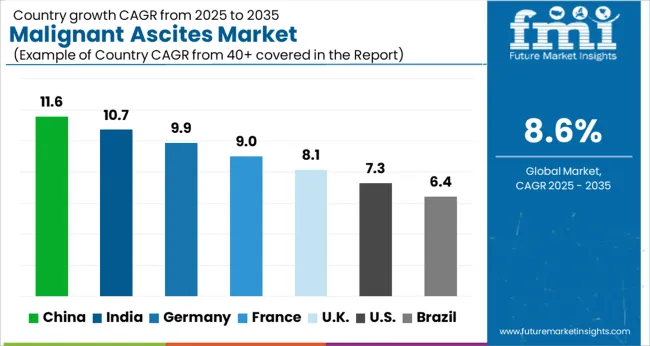
| Country | CAGR |
|---|---|
| China | 11.6% |
| India | 10.7% |
| Germany | 9.9% |
| France | 9.0% |
| UK | 8.1% |
| USA | 7.3% |
| Brazil | 6.4% |
The Malignant Ascites Market is expected to register a CAGR of 8.6% during the forecast period, exhibiting varied country level momentum. China leads with the highest CAGR of 11.6%, followed by India at 10.7%. Developed markets such as Germany, France, and the UK continue to expand steadily, while the USA is likely to grow at consistent rates. Brazil posts the lowest CAGR at 6.4%, yet still underscores a broadly positive trajectory for the global Malignant Ascites Market. In 2024, Germany held a dominant revenue in the Western Europe market and is expected to grow with a CAGR of 9.9%. The USA Malignant Ascites Market is estimated to be valued at USD 247.9 million in 2025 and is anticipated to reach a valuation of USD 500.7 million by 2035. Sales are projected to rise at a CAGR of 7.3% over the forecast period between 2025 and 2035. While Japan and South Korea markets are estimated to be valued at USD 33.5 million and USD 21.3 million respectively in 2025.
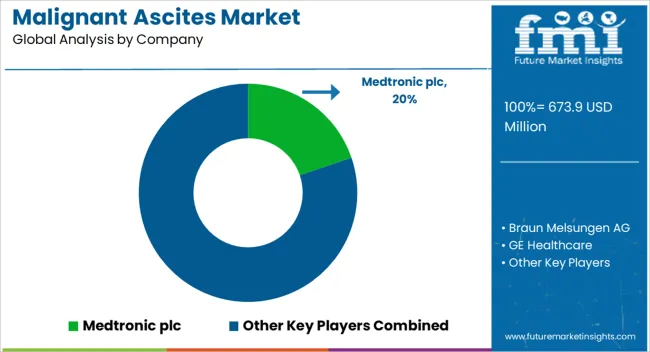
| Item | Value |
|---|---|
| Quantitative Units | USD 673.9 Million |
| Treatment Type | Paracentesis, Chemotherapy, Diuretics, and Surgery |
| Distribution Channel | Hospitals, Diagnostic Centres, Clinics, Retail Pharmacies, and Ambulatory Surgical Centre |
| Regions Covered | North America, Europe, Asia-Pacific, Latin America, Middle East & Africa |
| Country Covered | United States, Canada, Germany, France, United Kingdom, China, Japan, India, Brazil, South Africa |
| Key Companies Profiled | Medtronic plc, Braun Melsungen AG, GE Healthcare, Boston Scientific Corporation, Fresenius SE & Co. KGaA, BD (Becton, Dickinson and Company), and Pfizer Inc. |
The global malignant ascites market is estimated to be valued at USD 673.9 million in 2025.
The market size for the malignant ascites market is projected to reach USD 1,533.6 million by 2035.
The malignant ascites market is expected to grow at a 8.6% CAGR between 2025 and 2035.
The key product types in malignant ascites market are paracentesis, chemotherapy, diuretics and surgery.
In terms of distribution channel, hospitals segment to command 29.6% share in the malignant ascites market in 2025.






Full Research Suite comprises of:
Market outlook & trends analysis
Interviews & case studies
Strategic recommendations
Vendor profiles & capabilities analysis
5-year forecasts
8 regions and 60+ country-level data splits
Market segment data splits
12 months of continuous data updates
DELIVERED AS:
PDF EXCEL ONLINE
Malignant Pleural Effusion Market Size and Share Forecast Outlook 2025 to 2035
Malignant Infantile Osteopetrosis Market

Thank you!
You will receive an email from our Business Development Manager. Please be sure to check your SPAM/JUNK folder too.
Chat With
MaRIA